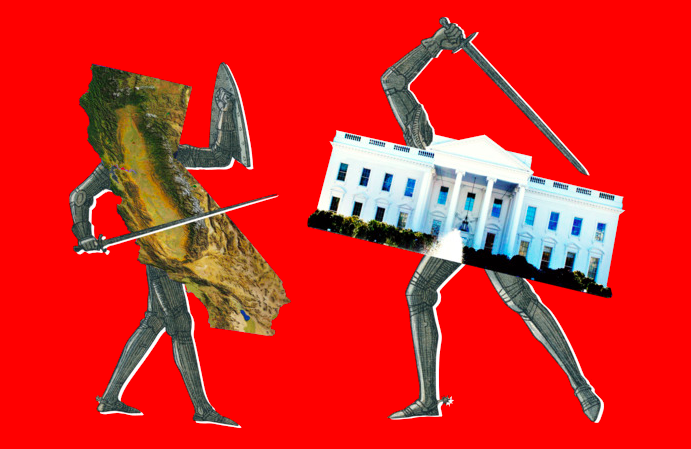
Photo-Illustration: Konstantin Sergeyev, NY Magazine Daily Intelligencer
A vacuum at the federal level is leaving lots of room for state governments to lead on environmental issues, but with widely varying impacts. The Washington Post’s Juliet Eilperin and Brady Dennis argue that many states are imposing much stricter laws and regulations on pollution and climate change than the federal government.
- They point to California’s cleaner tailpipe emission standards that are now being adopted by several other states, but also to state laws placing tighter restrictions on pesticides and chemicals in drinking water in Hawaii and New Jersey, and limits on methane pollution from drilling operations in Colorado and New Mexico.
The Associated Press, however, explains that the Environmental Protection Agency has either stopped enforcing certain laws or delegated the authority to the states (upon request) and those states have much more lax standards creating great health risks for local residents.
- They cite EPA’s delegation of its authority on disposal of coal ash to states resulting in much less enforcement and disparate results from state to state.
The Administration’s philosophy is to prefer whatever will be most helpful to business — supporting state sovereignty when it leads to less regulation, but preferring federal rules when states take a tougher approach. “Overall, we try to defer to the states as much as possible,” Wheeler said — though he added that the administration would oppose state action that would “interfere with national commerce” or “create uncertainties for consumers or for businesses.” How convenient.
- Most troubling, however, is one particular emerging trend — legislation restricting the right to protest things like pipelines or other fossil fuel infrastructure, or imposing very tough fines or even prison time. (A full accounting of such laws can be found at Protest Law Tracker.)
Why This Matters: When there are many different laws and standards, it is much more difficult for businesses to comply — this situation creates great uncertainty for businesses and that is expensive, particularly if there are numerous standards they must contend with. For example, according to The Post, the car companies originally pushed for the looser tailpipe standards, but they now want the federal government to reach an agreement with California rather than “fracture” the auto markets. Moreover, when the playing field is not “level” it creates great disparities for certain communities (can you say environmental justice) with human health implications — like locations with high rates of asthma or even cancers. States imposing tougher standards would prefer that the federal government create a uniform standard, but will step in when the federal government’s actions are insufficient. And restrictions on protests seem to us to violate the first amendment.
May 20, 2019 » clean air, clean water, enforcement, federalism, state

